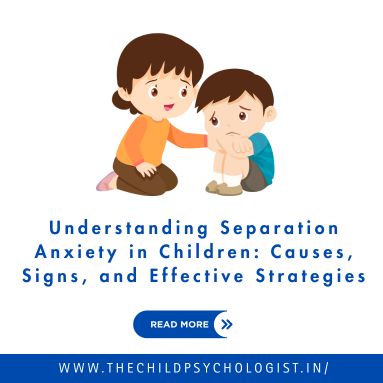Separation anxiety is a normal stage in childhood development, but when it becomes persistent, intense, or disrupts daily life, it may signal a deeper challenge that needs attention. Many parents mistake it for simple clinginess or misbehaviour, but in reality, it can be linked to childhood disorders that benefit from early guidance and support.
This blog explores the signs, causes, and proven behaviour counselling strategies parents can use to help children cope with separation anxiety—and when to seek help from a counsellor therapist.
What Is Separation Anxiety?
Separation anxiety is a child’s excessive fear or distress about being apart from a parent or carer. While it is most common between 8 months and 3 years of age, for some children it persists into their school years and significantly impacts:
- Learning (school refusal, poor focus in class)
- Social interactions (hesitancy in making friends, fear of group activities)
- Emotional wellbeing (persistent worry, clinginess)
For example, a child might cry intensely at school drop-off, refuse to sleep alone, or frequently complain of headaches or stomachaches when a separation is anticipated.
Why Does Separation Anxiety Happen?
Separation anxiety is linked to the attachment system—a child’s natural instinct to stay close to carers for safety. Although growing independence is part of healthy development, transitions and stress can trigger or intensify this anxiety.
Contributing factors may include:
- Developmental stage (especially ages 8 months–3 years)
- Sudden changes in routine (starting preschool, moving houses)
- Stressful family situations (e.g., parental conflict, relocation)
- Temperament (sensitive children may be more prone)
- Past experiences of trauma, illness, or hospitalization
Why this matters: Separation anxiety should not be dismissed as “over-attachment”. If left unaddressed, it may contribute to childhood disorders such as generalised anxiety or school refusal, and it can also take a toll on parental wellbeing.
Signs of Separation Anxiety in Children
Parents should look out for these warning signs:
- Intense crying or tantrums during drop-offs
- Refusal to go to school or activities without parents
- Frequent physical complaints (headaches, stomachaches) before separation
- Difficulty sleeping alone or insisting on co-sleeping
- Persistent worry about harm to parents or caregivers
- Clinginess or following parents constantly around the home
If these behaviours are severe, prolonged, or not age-appropriate, it’s wise to seek guidance from a counsellor or therapist specialising in behaviour counselling for children.
Practical Strategies Parents Can Try
Here are evidence-based techniques that can ease separation anxiety at home and school:
1. Start with Gradual Separation
Practice leaving your child for short periods and gradually increase the time apart.
2. Create a Goodbye Ritual
A hug, a high-five, or a special phrase builds predictability and comfort.
3. Keep Goodbyes Calm and Short
Prolonged goodbyes can increase distress. Stay confident and reassuring.
4. Prepare in Advance
Explain where you’re going and when you’ll return to reduce uncertainty.
5. Encourage Independence at Home
Give your child small opportunities to be independent, like playing in another room.
6. Collaborate with Teachers
Inform teachers so they can provide additional support during school transitions.
7. Stay Patient and Positive
Celebrate progress, no matter how small, instead of focusing only on setbacks.
8. Seek Professional Behaviour Counselling if Needed
When separation anxiety interferes with school, friendships, or family life, professional help is highly effective. A counselor therapist can provide personalized behavior counseling, therapy techniques, and parental guidance.
Final Thoughts
Separation anxiety is not a sign of poor parenting or weakness in your child. It’s a developmental phase that can be managed with consistent strategies, patience, and professional support when needed.
Left unaddressed, it may grow into long-term anxiety or contribute to other childhood disorders, but with timely intervention, children can build resilience and independence.
Remember, as a parent, your calm reassurance and structured guidance are powerful tools in helping your child feel safe.
At Urjasvini Child Development Center, we specialize in child psychology, behaviour counselling, and therapy for children. Our team of experienced counsellor therapists supports families in navigating separation anxiety and other developmental challenges, helping children thrive with confidence.
